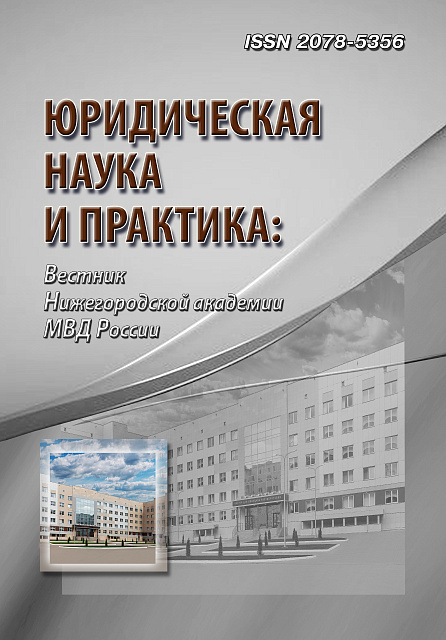Russian Federation
The relevance of the research topic is evidenced by the desire of the legislator to recognize unfinished torts as completed acts due to their increased social danger. The dialectical method in combination with instrumental methods of cognition was used as a methodological basis. During the study, it was established that in the current criminal law, reduced offenses in the form of preparation and attempt are contained in eight chapters of the Criminal Code of the Russian Federation. The legislative-textual approach to truncated crimes made it possible to identify a number of significant shortcomings in the texts of articles. In particular, in the same part of the articles there is an integration of completed and unfinished compositions, different in the degree of social danger, a combination of types of accomplices in one part of the article, and the formulation in different parts of the article of instructions on the liability of one accomplice , repetition of identical features in the disposition of the article, etc. Based on the results of the study, the author comes to a number of conclusions: in criminal legislation, along with traditional crimes, there are reduced crimes that represent structurally incomplete criminal acts. Reduced acts, the signs of which are specified in the regulations of the Special Part of the Criminal Code, are unfinished types of crimes, and reduced acts, the signs of which are given in the norms of the Special Part, are qualified as completed crimes due to their increased social danger. A text-centric approach to criminal legal regulations allows us to identify shortcomings in the legislative text and make proposals aimed at improving the quality of the legislative text by eliminating existing legislative and technical defects.
text-centric approach, reduced crimes, completed and unfinished torts
1. Russian criminal law. General part / ed. by V. S. Komissarov. St. Petersburg: Peter Publ., 2005. 569 p. (In Russ.)
2. Soviet criminal law. General part / B. V. Zdravomyslov, M. A. Gelfer, P. I. Grishaev. Moscow: Legal lit. Publ., 1982. 440 p. (In Russ.)
3. Nazarenko G. V. Russian criminal law. General part: course of lectures. Moscow: Publ. “Os-89”, 2000. 256 p. (In Russ.)
4. Ivanov V. D. Criminal law. A common part. Rostov-on-Don: Phoenix Publ., 2002. 320 p. (In Russ.)
5. Sitnikova A. I. Criminal law textual criticism: monograph. Moscow: Prospekt Publ., 2016. 304 p. (In Russ.)
6. Davydova M. L. Legal technology. General part: textbook. Moscow: Prospekt Publ., 2018. 232 p. (In Russ.)
7. Sitnikova A. I. Legislative textual criticism: criminal law aspect. Saarbrucken: LAP LAMBERT Publ., 2012. 372 p. (In Russ.)
8. Criminal Code of the Russian Federation (commentary with a guide to judicial practice) / ed. by A. I. Chuchaev. Moscow: Prospekt Publ., 2021. 1536 p. (In Russ.)
9. Panko K. K. Methodology and theory of legislative technology of criminal law in Russia. Voronezh: Voronezh State University Publ., 2004. 272 p. (In Russ.)
10. Baranov V. M. Notes in Russian criminal law: nature, types, problems of implementation. Problems of legal technology: collection. articles / ed. by V. M. Baranov. Nizhny Novgorod, 2000. Pp. 338–402. (In Russ.)











